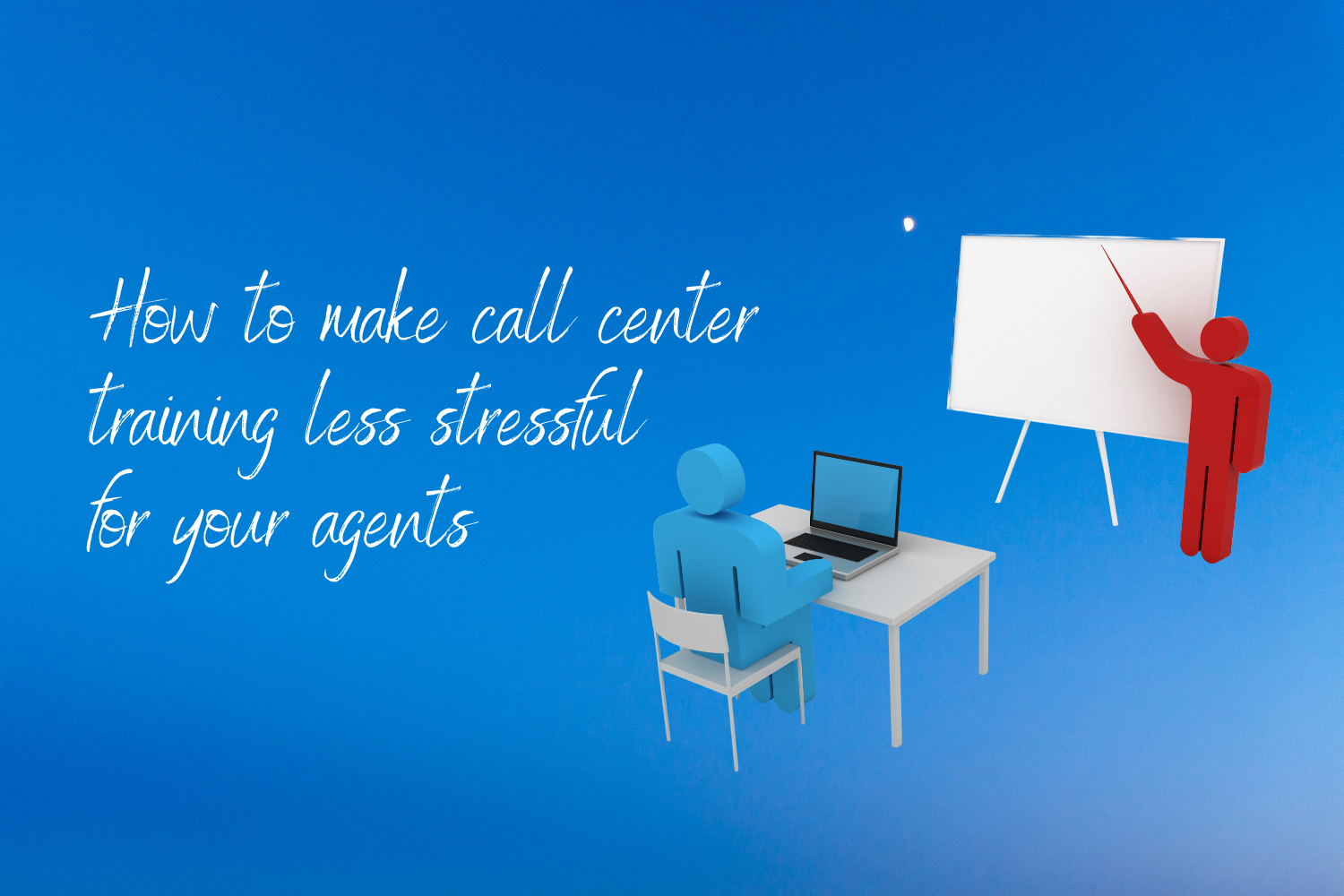How to Make Call Center Training Less Stressful For Your Agents (4 Tips)
I hate scary stories. If my friends want to watch a horror film, I’m out. No questions asked. These types of movies make me tense up, the stress causes me to curl into a tight ball, and then there is the inevitable screaming. (Please, keep this secret safe.)
The more I hear stories about the level of stress call center agents have on the job the more it sounds like a horror story to me.
At ScreenSteps — a knowledge base software that helps call centers train agents — we hear horror stories about the way new call center agents react to taking their first live calls.
Trainers frequently tell us agents are nervous to take their first calls. New agents will shake, cry, and we’ve even had one call center trainer tell us they had agents get physically ill (yes, vomiting).
And, while nobody has reported screaming, I bet there is plenty of internal screaming going on. But many have reported that their call center budgets for 50%-70% of their training class to quit.
It all points to one thing — stress.
Working in a call center doesn’t have to be so stressful. In fact, as a leader at your call center, I’m sure you don’t want your agents to suffer any of these side effects.
You probably feel like you can’t control the level of stress your agents feel. After all, the job is what it is. There will always be difficult procedures, disgruntled customers, and other dissatisfactory tasks that come with customer service. But there are things you can do.
Here are four tips to help make your call center training less stressful for your agents so that your new hires are ready and confident to tackle their first live calls.
1. Recognize what causes your agents stress in your call center
It’s uncomfortable for the agents to go through the stress of starting at the call center and it’s uncomfortable for you to watch them go through that stress.
So what is actually causing the stress? Why aren’t your agents confident after training to do their jobs?
Before you can alleviate the stress, you have to know what the pain points are. Once you know what is causing the stress, you can acknowledge it and make adjustments. A few situations that can cause stress at a call center include:
- New product that reps aren’t familiar with
- New co-workers they haven’t met yet
- New boss
- New procedures
- New systems that are unfamiliar or clunky
- New work environment
These stress points cover a wide range of issues. A single solution will not solve all of them at once. But there are different ways to help with all of these issues causing agents stress.
2. Build a supportive community
Being a newcomer at a job or on a team can be very lonely. Loneliness increases your stress. It can feel like it is you against the world, which is overwhelming.
Whereas, as a team, you are working toward a common goal. You are all invested in the company. You all care about each other and want your teammates to succeed. There is someone there when your agents get discouraged to encourage them.
When your agents know they have someone watching out for them, it helps them feel more secure and supported. Helping your agents feel a sense of belonging will help them want to stay with your company.
There are multiple ways to build camaraderie in your call center. Here are a few suggestions.
Team building exercises
While a call center agent might think that they are working on their own as they individually answer calls, the truth is a call center is a team effort.
You’ll want to build a team culture in your call center. You are all working towards common goals, whether that be short call handle times, top-of-the-line QA scores, or another metric. Get your call center to work together on these goals by building a community.

Use team building exercises to build camaraderie with co-workers and management. These team building activities can be as simple or creative as you want. The point of the exercises is to bring your agents together. Some suggestions include:
- Potlucks
- Competitions (ie: pumpkin carving, health challenges, etc.)
- Community humanitarian efforts (ie: food drives, toy drives, etc.)
- Desk decorations for holidays
- Hand out awards
- Themed dress code days (ie: casual Friday, NFL jersey day, etc.)
- Holiday celebrations
While these suggestions may seem out of place, they provide a gateway to connection. They provide employees with common experiences so that they build memories and trust with one another. This will help them feel safer on the job if they need to turn to one of their fellow employees for help.
Assign new hires mentors
Build a mentoring program in your call center so that experienced agents can help the newest members of your team.
You don’t want your agents only knowing the other agents they were in class with during training. They are all at the same level of understanding.
Match new agents with tenured agents. This gives new hires an automatic friend who is in their court for when they have questions or need assistance.
Through the mentoring program, you are setting the expectation that the new agents will have questions and it is okay to ask those questions. They will know exactly who they can turn to in order to find those answers.
3. Reduce opportunities for confusion
When you are learning everything all at once, it is easy to become overwhelmed and confused. As you leave less room for confusion and help your employees keep everything straight, they will not feel as stressed. Instead, they will be armed for their new roles.
You’ll want to provide your agents with tools and resources to succeed. You’ll want to emphasize these different areas during training.
Clarify what product/service they are supporting
Make sure your agents are briefed on what your company does. What services do you provide? What are your products and services used for? The agents don’t need to be experts, but they need to feel confident that they can answer general questions a customer may have.
If your company has products, it is wise to have those products in the room during training. While the agents won’t work directly with those products, it will help them understand the products so they will be more informed when they talk to customers on the phone.
So if your company sells printers, make sure those printers are present during training.
It can be helpful to have guides (ie: PDFs, Word Docs, Excel docs, etc.) that agents can reference after their training is complete. These guides can overview your products and services.
Provide instructions on how to use the systems
Sometimes when you’ve used a system for a long time, you forget the learning curve and the little details that you didn’t understand when you started.
During training, you’ll need to clarify how to use the systems and different software in your company. You’ll want to explain how each system fits into the big picture.
Then start at the beginning on teaching agents how to use the systems. How do they access the systems? How do they use it?
In training, meet your new hires where they are at. What systems have they used in the past? You can relate what they’ve used to what they’re going to use in your company. This provides your new agents a reference point and helps them learn faster.
Explain the policies, processes, and procedures
It takes a lot of time to memorize a whole set of policies, processes, and procedures. And then it is easy to forget a step or one small detail.
The best way to help your agents with policies, processes, and procedures is by documenting them as help guides. These guides can be used to help your agents remember what to say and do on a call.
Reps need to know when they can do certain actions. They need to feel confident about where they need to click to complete procedures. They need to know where to write notes from a call.
Make it easy for them to find resources
Not being able to find what you need is a huge stressor.
That’s probably why I made a rule when I was a babysitter that we couldn’t play hide and seek. Those minutes of not knowing exactly where the kids were who I was supposed to be watching were probably some of the most stressful minutes of my life.
If your agents are searching for a help guide but unable to find the guide, their stress is going to skyrocket. They know they’ve seen and used the guide before, but then they can’t find it. That breaks down their trust in your system.
Organize your documents in a way that is easy to find whether that is in a shared folder or a knowledge base. Your agents should know exactly where they need to turn for their answers.
If you use a knowledge base to store all of your resources, make sure your knowledge base is optimized so that it is easy to search for guides.
4. Increase confidence and competency
Nothing can substitute for just knowing how to do that job, but those expert levels aren’t typically achieved on the first day at the job. Over time, agents become experts as they encounter different scenarios on the job.
While your new agents won’t have time and experience on their hands, you can still help increase their competency (and, as a result, their confidence).
Have them master the soft skills
While it will take your new agents a long time to become experts at all the detailed procedures in your company, they can be masters of the soft skills by the end of onboarding. Soft skills are the different skills needed to handle a call.
Control the call
Teach the agents how to lead a conversation when they answer the phone. An agent will be more confident if they are running a conversation when a customer calls in.
Empower the caller
Empowering the caller is more about being empathetic. It’s the agent’s job to ensure the caller that their needs will be met and that the agent can help them find the answers the caller is searching for.
Zero in on the caller’s purpose
When the agent is in control of the call, it is easier to get to the point of the call. Callers often won’t know internal vernacular for procedures and products, so help your agents know how to discern the questions the callers are actually asking.
Deal with difficult callers
There’s no hiding it. Eventually, your agents will have to deal with a disgruntled caller. Teach your agents how to handle these difficult scenarios — what to say, what to do, how to respond — will help them manage difficult situations.
Help them understand the why
Provide your agents with a big picture perspective. When we tell reps to do something without explaining the why, it makes the instruction less concrete. It’s harder for them to see and understand the consequences of their actions.
Does it really matter if they ask these questions in a particular order? What happens if they don’t click this box before they save their notes?
As reps begin to understand the big picture, they feel more confident handling calls.
Create opportunities to gain experience
Before unleashing your agents on live calls, give your reps a broad range of experiences during training.
Have them role-play different scenarios, including talking to those angry customers. Think about a video game. Start off easy. Then gradually get more difficult.
You could even use role-playing as a team building activity, which will get experienced and new agents working together.
Let them take notes in your system. Have them practice leading a conversation. Have them search for the guides they need while on a fake call.
If they can encounter as many scenarios as possible in training, they will be more comfortable and confident when they run across these situations on the job. They won’t have to stress about dealing with a call that they’ve never handled before.
Set your agents up for success with help guides
Learning a new job is intimidating. If the stress becomes overwhelming, you don’t want your new agents quitting because the stress is too much to handle.
By building a community and providing new agents the tools they need to feel confident on the job, you will help properly prepare your agents and reduce the stress they experience while onboarding.
One of the best things you can do to alleviate the pressure of memorizing all of your procedures during training is to provide clear call flows and help guides for your agents.
At ScreenSteps, we provide a robust set of authoring tools so our customers can quickly and clearly document procedures in their knowledge bases. We help companies write guides that agents can use without needing to put customers on hold.
Provide your employees better support with the constant companion of help guides. Want help writing clearer call flows? Try these 3 tips for how to turn technical guides into agent-friendly scripts.



